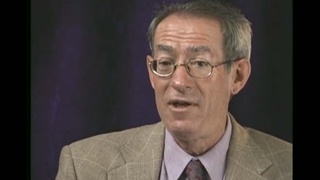Interviews
Education in camp
But the real problem with school was [it was] so bad. At least from my standpoint, it was so bad—so poor. It really began to get very demoralizing, because you realize you weren’t getting an education. We said, gee, we ought to have a class in this. We ought to have a class in that, and so forth, and try to figure out how we could get this class. It was just a mess. And a lot of people suffered from that when they went to college, and stuff like that. But I was very fortunate to go to the University of Chicago because they had sort of remedial classes. If you didn’t know anything, they’d catch you up on it. So I was very lucky, I think. But, if they don’t have that kind of program in the college, it was pretty bad, because there [were] just a lot of gaps. I didn’t realize the gaps existed, until I went to college. And I said, geez, I don’t know anything about humanities. Haven’t read very much or seen any plays or anything—haven’t listened to any music. (laughs) So I just felt real ignorant.
Date: June 12, 1998
Location: California, US
Interviewer: Darcie Iki, Mitchell Maki
Contributed by: Watase Media Arts Center, Japanese American National Museum
Explore More Videos

The Kids and Japanese Language (Japanese)
(b. 1937) A war bride from Yokohama

Reaction of Japanese American community toward draft resistance stance
(b. 1925) Draft resister

The role of the media in influencing people's opinions
(b. 1925) Draft resister

Reaction to a 1942 speech by Mike Masaoka, Japanese American Citizen League's National Secretary
(1915 - 2011) Nisei florist who resettled in New York City after WW II. Active in Japanese American civil rights movement

Deciding whether to answer "yes-yes" on the loyalty questionnaire in order to leave camp
(b. 1925) Draft resister

Father’s will to have Japanese education
(b. 1922) Canadian Nisei who was unable to return to Canada from Japan until 1952

First learning about the incarceration experience in college
(b. 1955) Lawyer

Reasons for conformity and competitiveness in Gardena, California
(b. 1946) Lawyer

Role of the redress movement in helping Nisei to open up about their wartime experiences
(b. 1946) Lawyer

Not recognizing father after reunion at Crystal City, Texas
(1937 - 2021) Teacher

A child's memories of activities at Crystal City, Texas
(1937 - 2021) Teacher


Japanese American railroad workers are fired following the bombing of Pearl Harbor
(b. 1923) Chick sexer


A racist encounter at a movie theater following the bombing of Pearl Harbor
(b. 1923) Chick sexer
